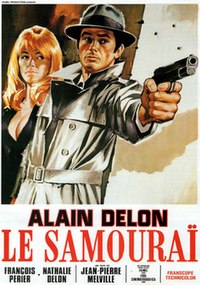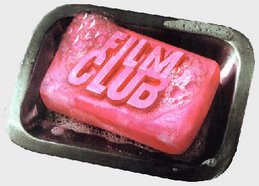There is no solitude greater than the samurai's, unless perhaps it be that of a tiger in the jungle.
-Book of Bushido

Honor, Pride, Service and death. Words for a warrior. Whether a soldier in an army or a lone assassin, these words are the code that has bound warriors for thousands of mankind's years. In film, as well as history, the Samurai have served as the archetypes for warriors that follow a strict code. There is a special fascination that film audiences hold for the Samurai. They are embraced for their supernatural combat skills and unbreakable Zen, yet it is these mechanical qualities that serve to distance them from the audience as well as the other characters. Characterized by solitude and inevitable death, Samurai have become some of film's great tragic characters and no film emphasizes their tragedy better than Le Samourai.
Jef Costello (played by Alain Delon ), is not the typical Samurai. For one, this is set in 1967 Paris and Costello is not a robe-clad martial artist. The title of the film as well as the opening passage from the Book of Boshido serve to create a metaphor for the audience that will connect Costello to the notions of a Samurai outside the usual combat and culture. Costello is a hitman. A killer that is so methodical and focused that he does not even have a criminal record (since he is never caught.) His drab, sparse apartment and cold, deliberate interactions with other characters reflect his complete dedication to his work. There is no sense of happiness in this character, giving the impression that his solitude is a necessary aspect of his duty.
The director, Jean-Pierre Melville, distinctly styles this movie to speak of the character. Drab color and ugly mornings reflect an overall mood of melancholy. The film is nearly silent, which caused me to listen to the thoughts in my head (or passing through the character's?) and methodically be weighted down by his troubles. Perhaps most importantly, Melville leaves out intense action scenes. Roger Ebert states the reasoning better than I can.
Action is the enemy of suspense. Action releases tension, instead of building it. Better to wait for a whole movie for something to happen (assuming we really care whether it happens) than to sit through a film where things we don't care about are happening constantly.
The calm Costello, after being betrayed by his employer and chased by the police, is wearing down. We can see the exhaustion in his eyes. An exhaustion not a result of 15 straight fights (like in a typical film), but because honor and pride are battling inside his head and he is desperately (yet deftly) planning his own salvation.

3 comments:
J,
Well put. I think you're insights on suspense are right on (and the Ebert quote is perfect).
I’m still not 100% sure about everything, however, and was hoping that someone could help clarify….
To me, Jef seems to do something out of character at the end of the film (well, I think that’s the point…). He takes a contract, even if only to set up his own death, but then doesn’t carry it out. What is it about not killing the piano player, and therefore not fulfilling his contract, that makes his death more honorable? As I interpreted it, Jef’s samurai characteristics don’t allow for emotional/moral/mortal judgments. Saving the piano player seems to be such a judgment. Is it that as soon as he begins to view the piano player as a person (she lies to save his life), and not just a potential contract, part of him begins to lay out his own death (the inevitable end samurai’s career)?
“He’s wounded,” says a policeman. And we realize that Jef’s having a lot of trouble for an assassin without a criminal record. Both the external wound and the internal wound (whatever emotion/feelings he has that repeatedly draw him back to the piano player) remind him of his mortality, and subsequently, his fall from the legendary service status of the near-divine samurai.
I think it’s the circularity of the meaning that’s confusing to me. He kills himself because he feels. Because he feels, he doesn’t kill her. Because he doesn’t kill her, he doesn’t fulfill his contract, so he cannot be a samurai. But that’s all he is. So he has to kill himself. Because he feels…
There is one immediate conflict with samurai philosophy from the start that troubled me.. The reality that Samurai don't simply kill for money, they need to feel that there is some honor in the task. Right there appears to be a problem and kind of breaks down most of my thoughts when applied.
However, I see your point. The way I understand it, Costello owes the piano player a life debt and killing her conflicts with his honor. He accepts the job, then discovers who is to be killed, and is caught between honoring who he serves and who once honored him. It would have probably made more sense if the gun was loaded, but then his actions would have not been understood by the audience to be at least partially suicidal.
I read a little bit about Samurai and they are often presented with this paradox, of two-fold shame. More often than not, if not killed in duty, a samurai eventually turns to seppuku as the last chance for honor.
Jay wrote "The calm Costello, after being betrayed by his employer and chased by the police, is wearing down. We can see the exhaustion in his eyes"...
One thing I vividly remember striking me about this movie is that after Jef is released from the police station, when he is sitting in a taxi he has completely real-looking bags under his eyes. Now, this may seem like a minor point... but during the movie I was thinking - man, those are the most real looking bags under an actor's eyes that I have ever seen! It was funny, because at first I thought wow, I really believe the actor as that character... he actually has bags under his eyes! He is so exhausted! But then of course if made me realize that I was in fact watching a movie, an actor portraying this character who he is not.
So I'm not sure what my point is, but I think the actor did a great job of being his character (weather those bags were on purpose or not), but maybe I am not used to such a performance and as a result it makes me realize that I am watching a movie even more?!? Are the actors that I have been watching lately not this good? Or do they or their directors overlook points that could make them more realistic? Do they not want to be that realistic? Interesting anyway.
Post a Comment